Krakow, Poland became the epicenter of a heartfelt reunion in June this year as 60 alumni of the MBA Enterprise Corps (MBAEC) gathered to honor Janusz Jaworski, the Corps’ Country Director from 1991 to 1997. Organized by Poland MBAEC Alumni, the event was a tapestry of nostalgia and mentorship—and a celebration of the program’s profound impact–and Jaworski’s leadership.
And I had the great privilege of being invited to be a part of this historical event.
A Catalyst for Change
Founded in 1990 by the Kenan Institute of Private Enterprise and the Consortium for the MBA Enterprise Corps, the MBA Enterprise Corps (MBAEC) was established with a visionary mission: to assist the transition of Central European countries from socialism to capitalism following the end of the Cold War. This period marked a significant shift in the political and economic landscapes of these nations, necessitating the infusion of new knowledge, skills, and practices to build robust, market-driven economies. MBAEC addressed this need by deploying recently graduated recipients of Master of Business Administration (MBA) degrees to work directly with private and privatizing enterprises in these transitioning economies.
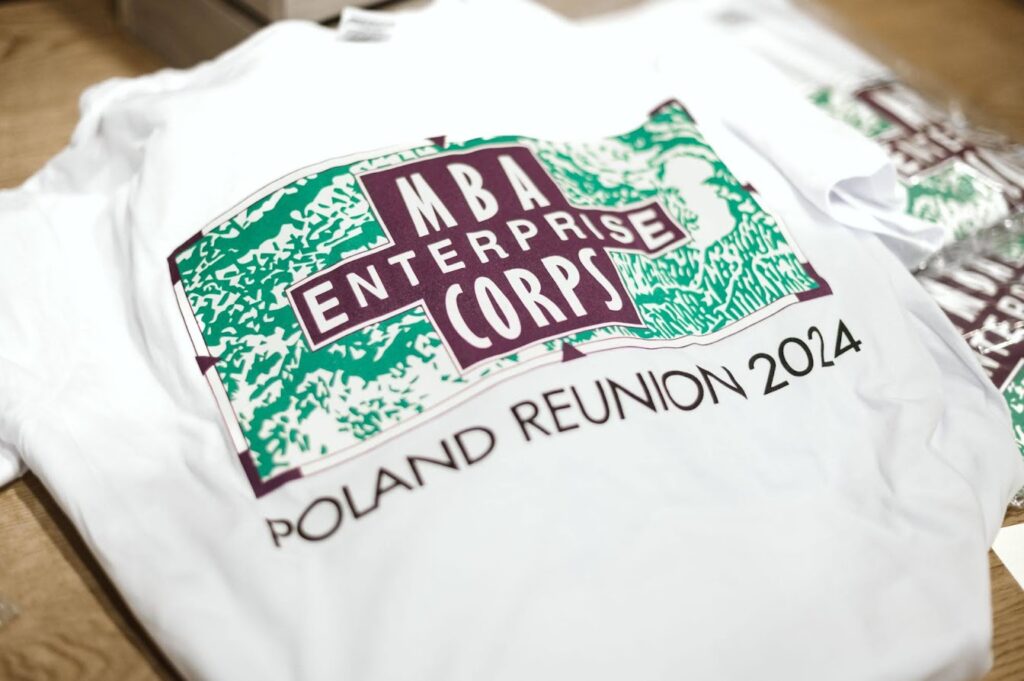
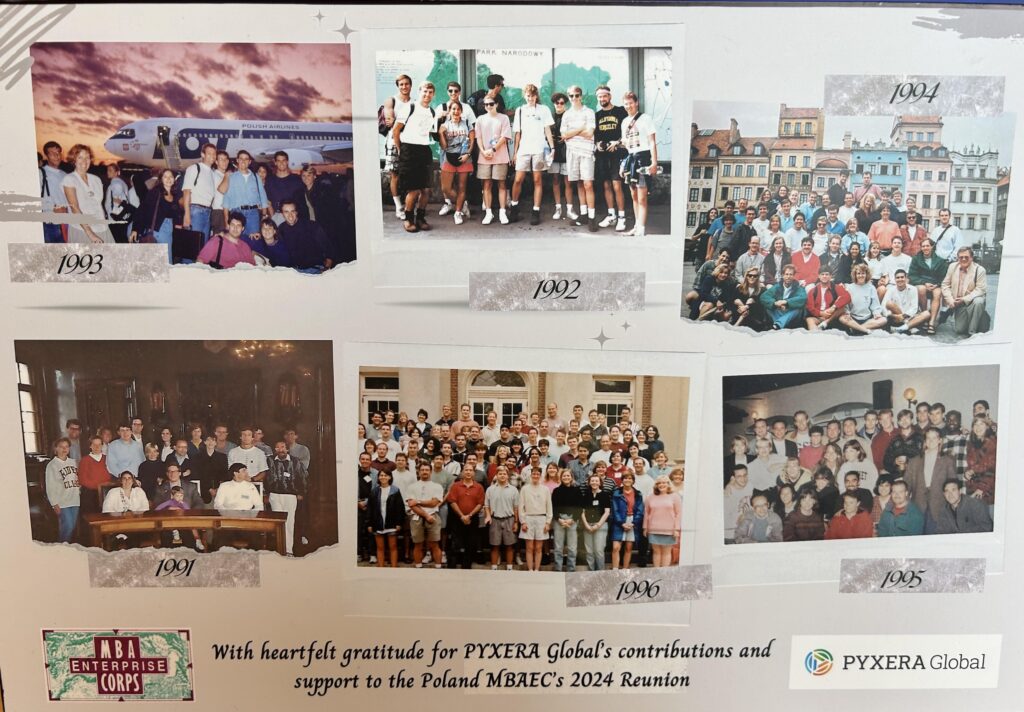
The idea grew in response to challenges expressed by Ross Perot and David Gergen at an MBA Symposium at UNC in the fall of 1989. They urged MBAs to help open new paths for American business in Eastern and Central Europe, and Frank Hawkins Kenan sent two faculty members from the Business School in early 1990 to investigate the possibility of a volunteer Corps for MBAs. Their reception in Poland, Czechoslovakia, and Hungary was strongly positive, with the Krakow Academy of Economics and the Center for Democracy and Free Enterprise in Prague even offering to front the costs of initiating the program in their countries. Soon, the Corps was in business.
Initially involving 16 leading U.S. graduate schools of business (Carnegie Mellon, Columbia, Cornell, Dartmouth, Duke, Emory, George Washington, Georgetown, Northwestern, Notre Dame, Thunderbird, UC-Berkeley, UC-Irvine, UCLA, UNC, and Vanderbilt), the Corps placed recent MBA graduates in positions within private companies in emerging and transforming economies. Approximately 520 Corps members assisted with all aspects of management and technology transfer across 21 countries over the years. They were fresh young professionals, but their energy and expertise played a crucial role in helping businesses navigate the complexities of new economic landscapes, fostering a new era of growth and stability.
Stories of Impact
One MBAEC volunteer outlined an example of the results they achieved in one of their regular reports from the 1990s: “Many of the managers now understand western business models and have increased their ability to solve problems collaboratively and to build consensus; this I see as one of my greatest accomplishments. In terms of tangible results, I can say that they have learned about basic business frameworks, business planning, a variety of human resources issues, marketing strategies, and market dynamics.”
A 1991 New York Times article describing the Corps’s work also features anecdotes from participants assigned to help open a new bank, set up small-business clinics, and modernize technology in a steel mill. Beyond testifying to the program’s impact, though, their stories highlight the MBAEC’s most critical innovation: rather than simply dropping Americans into foreign countries to provide short-term assistance, “the idea of the MBA Enterprise Corps is to integrate the young business graduates into the companies themselves.”
The results were transformational.
Personal Transformations and Profound Experiences
“We have a lot to learn about making change in this part of the world.”
With extensive language training, local housing, and salaries paid by the host companies themselves, it’s no wonder the impact of the immersive MBAEC program extended far beyond business. Past participants described the experience as transformative, reshaping their personal perspectives and professional approaches.
“This experience has been the most profound in my life,” one participant said. “It has been a learning experience from day one. Although at times it seemed as though my hair would fall out from the stress and frustration, this in itself was part of the experience.”
Such profound experiences can be difficult to describe, let alone quantify. The program encouraged personal growth, resilience, and adaptability. Participants learned to navigate dynamic environments and manage expectations. They also discovered the importance of cultural assimilation and understanding, with one alum stating over 30 years ago, “Perhaps the best thing I discovered was that we have a lot to learn about making change in this part of the world. I would recommend the Corps experience to anyone willing to challenge their own opinions and perspectives on life, to anyone who likes to work and live in an extremely dynamic environment, and, of course, to anyone who really loves to travel and assimilate to foreign cultures.”
A Lasting Legacy
While the MBAEC is no more, its legacy lives on. In 2000, it merged with Pyxera Global to expand its mission of supporting growing markets and cross-cultural collaboration through new skills-based volunteering programs that continue to transform lives and communities around the world today.
The legacy of MBAEC also endures through its alumni, who have gone on to hold senior positions in various industries, contributing to inclusive, globally-minded, and regenerative business practices. Despite the challenges and frustrations they faced in their work, alumni at the reunion in Krakow looked back on their experiences with a sense of accomplishment and personal growth.
The bonds between alumni aren’t the only lasting impact of the program, of course. The strong, resilient connections between the United States and Central Europe today—connections the MBAEC helped forge—demonstrate the power of person-to-person interaction in driving sustainable development, business growth, and international understanding. MBAEC alumni have left behind a legacy of empowerment: they have built successful businesses; they have helped individuals take control of their destinies in business and life; and they have continued to foster global partnerships and cross-cultural understanding.
Returning to Poland & Honoring Janusz Jaworski
“[Janusz’s] work with the MBA Enterprise Corps exemplifies the power of person-to-person interaction in building strong, resilient communities.”
The MBAEC program in Poland, under the stewardship of Janusz Jaworski, deployed over 160 young American advisors to Polish companies and financial organizations. These advisors played a crucial role in helping these entities adapt to the rapidly changing economic landscape, but the effects of their work extended beyond business: many volunteers formed lifelong friendships and professional connections lasting over 30 years, with several even settling in Poland permanently.
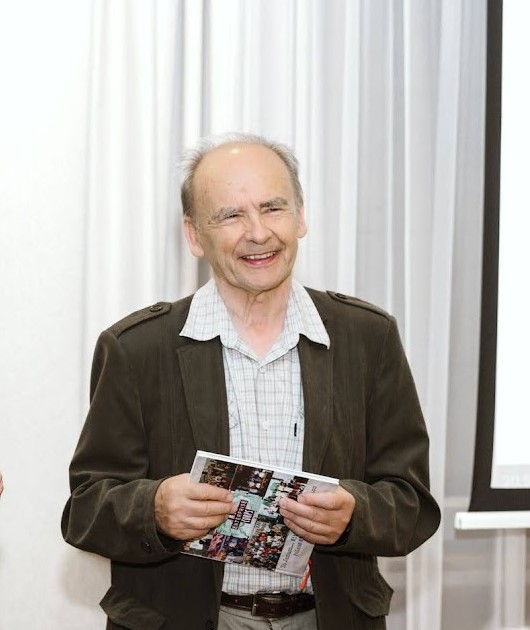
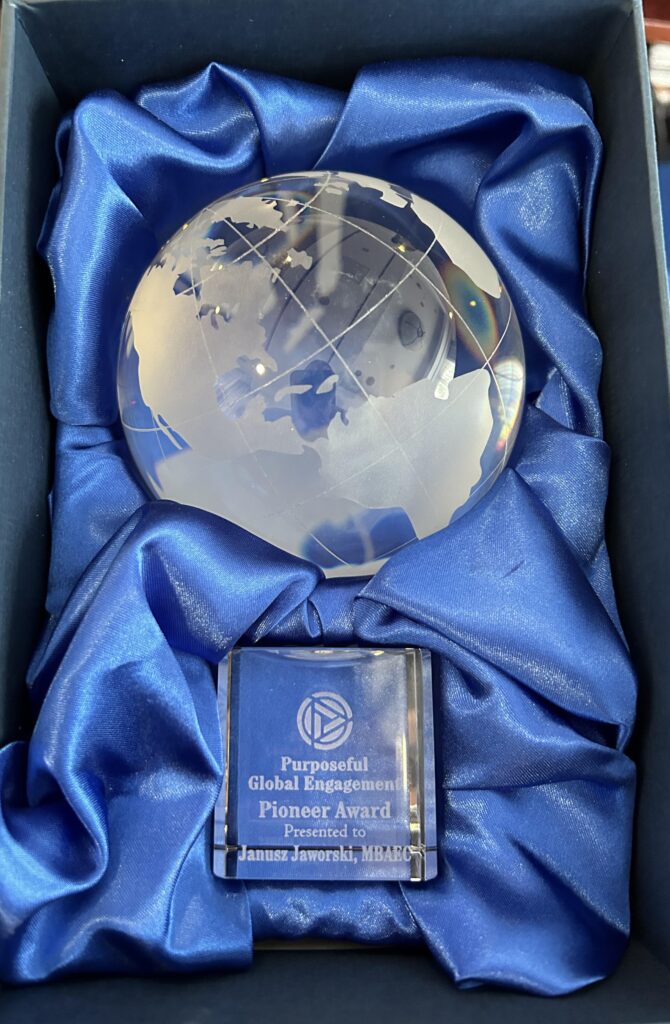
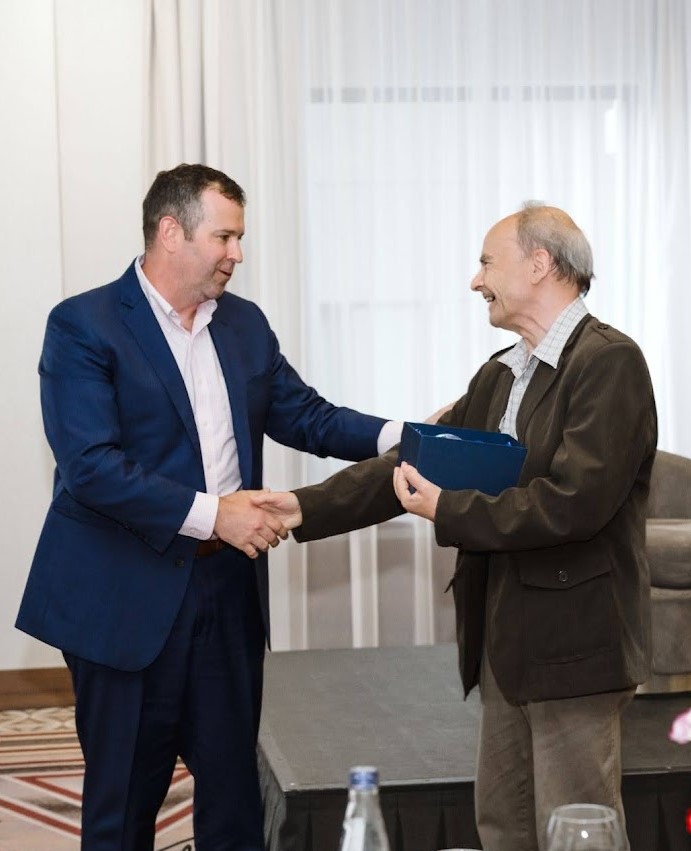
The alumni event in Krakow was a testament to the enduring bonds formed through MBAEC. Highlights included a Pyxera Global-sponsored welcome happy hour, pro bono mentoring sessions between MBAEC alumni and local entrepreneurs, and a formal event featuring a panel discussion and speeches from the US Consular General. The ceremony culminated in the presentation of the “Pyxera Global Purposeful Global Engagement” award to Janusz Jaworski, recognizing his servant leadership and contributions to citizen diplomacy.
Jaworski’s leadership and dedication were central themes throughout the event. Alumni expressed their gratitude for his guidance and the opportunities MBAEC provided. Jaworski’s historical walking tour of Krakow, sharing his family history and the city’s pivotal events, was a poignant moment, illustrating his deep connection to both the program, the volunteers who he looks at like family, and his homeland.
Engaging with Today’s Business Professionals
The Krakow reunion wasn’t just a celebration of past achievements, though; it emphasized the ongoing relevance of MBAEC’s principles, as well as Pyxera Global’s commitment to integrating alumni experiences into its initiatives today.
The pro bono mentoring sessions highlighted how seasoned professionals can provide invaluable insights to emerging entrepreneurs, fostering innovation and leadership in today’s complex world. As I listened to the alumni recount their experiences of arriving in Poland in the 90s, it felt like stepping back in time. The stories of challenges overcome, partnerships forged, and lives transformed were incredibly inspiring. I am eager to engage with these alumni on their next journey, leveraging their rich experiences to benefit Pyxera Global’s partner organizations and the broader social sector.
It was an honor to present Janusz Jaworski with the “Pyxera Global Purposeful Global Engagement” award, a recognition well-deserved for a leader who has been a catalyst for change and a beacon of servant leadership. His work with the MBA Enterprise Corps exemplifies the power of person-to-person interaction in building strong, resilient communities. It remains critical work, and reflecting on his accomplishments in Krakow, so close to a newly unfolding crisis in Eastern Europe, it was impossible not to think of the support needed today in Ukraine.
The challenges we face today are clearly not so different than the ones MBAEC alumni faced then. Their reunion was a powerful reminder of the enduring legacy of citizen diplomacy, skilled volunteerism, and the importance of continuous engagement with those who have contributed so significantly to global partnerships. The bonds formed through MBAEC have stood the test of time, enriching both personal and professional lives and offering a blueprint for future global collaborations. We’re ready to get to work!
